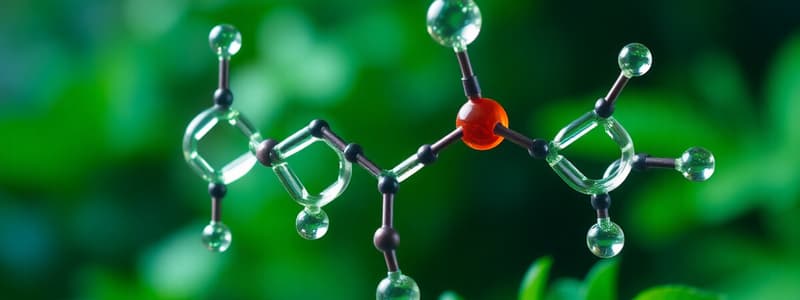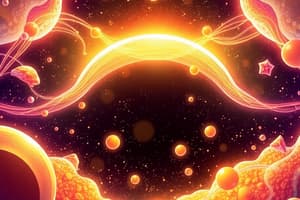Podcast
Questions and Answers
What elements are carbohydrates composed of?
What elements are carbohydrates composed of?
- Carbon, Hydrogen, and Nitrogen
- Carbon, Hydrogen, and Oxygen (correct)
- Carbon, Oxygen, and Nitrogen
- Hydrogen, Oxygen, and Nitrogen
What is the ratio of carbon, hydrogen, and oxygen in carbohydrates?
What is the ratio of carbon, hydrogen, and oxygen in carbohydrates?
1:2:1
What are the simplest carbohydrates called?
What are the simplest carbohydrates called?
Simple sugars
Which of the following is NOT an example of a disaccharide?
Which of the following is NOT an example of a disaccharide?
What are polysaccharides made of?
What are polysaccharides made of?
Plants produce glucose as a form of storage for excess sugar.
Plants produce glucose as a form of storage for excess sugar.
Which of the following is NOT an example of a polysaccharide?
Which of the following is NOT an example of a polysaccharide?
What are lipids composed of?
What are lipids composed of?
Fatty acids are made of a string of carbon atoms with an acid group attached on the end.
Fatty acids are made of a string of carbon atoms with an acid group attached on the end.
Which of the following is NOT a type of lipid?
Which of the following is NOT a type of lipid?
Phospholipids are a major component of cell membranes.
Phospholipids are a major component of cell membranes.
What are steroids composed of?
What are steroids composed of?
Which of the following is NOT a function of proteins?
Which of the following is NOT a function of proteins?
What are the building blocks of proteins?
What are the building blocks of proteins?
All organisms use the same 20 types of amino acids.
All organisms use the same 20 types of amino acids.
The bond between amino acids is called a peptide bond.
The bond between amino acids is called a peptide bond.
Which of the following is NOT a function of proteins?
Which of the following is NOT a function of proteins?
What are the two main types of nucleic acids?
What are the two main types of nucleic acids?
Carbon can form up to 4 covalent bonds.
Carbon can form up to 4 covalent bonds.
Which of the following is NOT a way that carbon compounds can be structured?
Which of the following is NOT a way that carbon compounds can be structured?
What are smaller compounds called that combine to form larger organic molecules?
What are smaller compounds called that combine to form larger organic molecules?
What are larger organic molecules called that are formed by combining monomers?
What are larger organic molecules called that are formed by combining monomers?
What chemical reaction is used to build molecules by removing water?
What chemical reaction is used to build molecules by removing water?
What chemical reaction is used to break molecules down by adding water?
What chemical reaction is used to break molecules down by adding water?
Functional groups are special groups of atoms that carry out chemical reactions.
Functional groups are special groups of atoms that carry out chemical reactions.
Match the functional group with its primary use:
Match the functional group with its primary use:
Flashcards
Organic Chemistry
Organic Chemistry
The study of carbon-containing compounds.
Carbon's Prevalence
Carbon's Prevalence
Carbon forms many bonds due to its four outer shell electrons, allowing for diverse molecular structures.
Carbohydrates
Carbohydrates
Organic molecules with C, H, and O in a 1:2:1 ratio. Used for energy and structure.
Monosaccharides
Monosaccharides
Signup and view all the flashcards
Disaccharides
Disaccharides
Signup and view all the flashcards
Polysaccharides
Polysaccharides
Signup and view all the flashcards
Lipids
Lipids
Signup and view all the flashcards
Fats
Fats
Signup and view all the flashcards
Fatty Acids
Fatty Acids
Signup and view all the flashcards
Saturated Fatty Acids
Saturated Fatty Acids
Signup and view all the flashcards
Unsaturated Fatty Acids
Unsaturated Fatty Acids
Signup and view all the flashcards
Phospholipids
Phospholipids
Signup and view all the flashcards
Steroids
Steroids
Signup and view all the flashcards
Proteins
Proteins
Signup and view all the flashcards
Amino Acids
Amino Acids
Signup and view all the flashcards
Peptide Bond
Peptide Bond
Signup and view all the flashcards
Nucleic Acids
Nucleic Acids
Signup and view all the flashcards
Study Notes
Organic Chemistry Overview
- Organic chemistry studies organic compounds, primarily those containing carbon.
- Many organic compounds originate from living things.
- Carbon's structure allows for extensive bonding with other atoms.
Carbohydrates
- Carbohydrates consist of carbon, hydrogen, and oxygen in a 1:2:1 ratio.
- Sugars and starches are examples.
- Living things use carbohydrates for energy and structural support.
- Monosaccharides (simple sugars): Glucose and fructose are examples.
- Disaccharides: Two monosaccharides bonded together (e.g., sucrose, lactose, maltose).
- Polysaccharides: Large polymers of linked monosaccharides (e.g., starch, cellulose used by plants, glycogen used by animals).
Lipids
- Lipids include fats, oils, waxes, and steroids.
- Comprised mainly of carbon, hydrogen, and oxygen (similar to carbohydrates, but in different ratios).
- Fats: Composed of glycerol and three fatty acids, used for energy storage and insulation. Fatty acid structure dictates fat characteristics. Animals typically have about 30 fatty acids.
- Phospholipids: Lipids containing phosphorus, key components of cell membranes.
- Steroids: Lipids with four linked carbon rings (e.g., cholesterol, hormones).
- Waxes: Organic compounds composed of fatty acids and alcohols.
Proteins
- Proteins are organic compounds containing carbon, hydrogen, oxygen, nitrogen, and sometimes sulfur.
- Essential building blocks for living things (e.g., muscles, hair, and skin).
- Amino acids: The building blocks of proteins; 20 common amino acids.
- Peptide bonds: Covalent bonds linking amino acids.
- Proteins have diverse functions including movement, structure, biochemical control, transport, storage, and regulation.
Nucleic Acids
- Nucleic acids (DNA and RNA) are large, complex molecules composed of carbon, hydrogen, oxygen, nitrogen, and phosphorus.
- They carry genetic information.
- DNA: Deoxyribonucleic acid (nuclear and mitochondrial).
- RNA: Ribonucleic acid (mRNA, tRNA, rRNA).
Studying That Suits You
Use AI to generate personalized quizzes and flashcards to suit your learning preferences.




